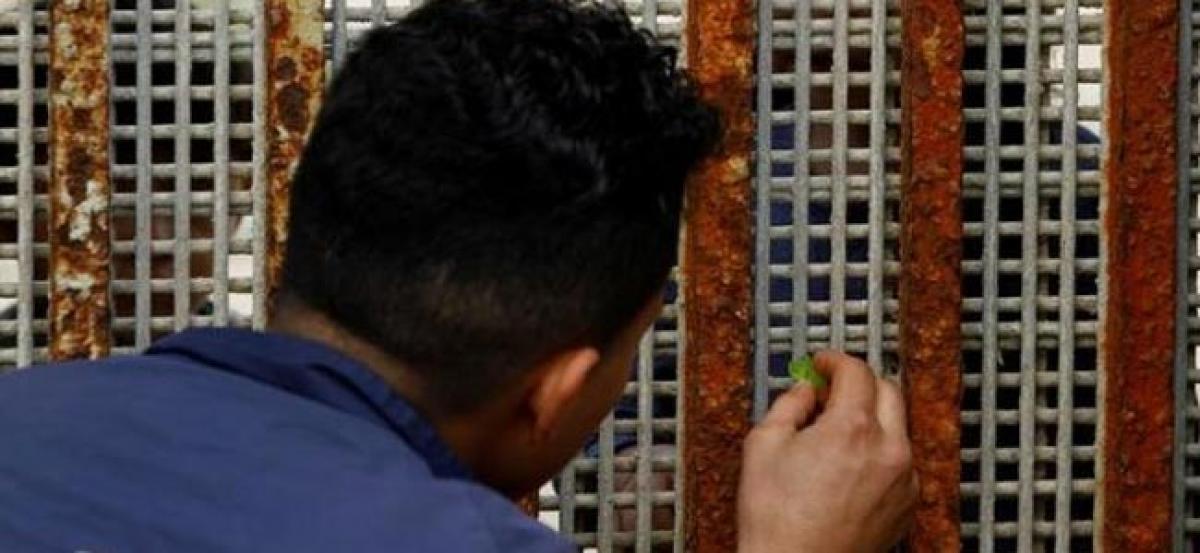Live
- NASA Tracks Five Giant Asteroids on Close Approach to Earth Today
- Pushpa 2 Hits ₹1000 Crore in 6 Days: How It Compares to Other Top Indian Films
- Vivo X200 and X200 Pro Launched in India: Price, Specifications, and Features
- Nitin Gadkari Admits Feeling Embarrassed at Global Summits Over Rising Road Accidents in India
- Comprehensive Review on Indiramma Housing Survey and Welfare Initiatives Conducted via Video Conference
- Jogulamba Temple Records Rs 1.06 Crore Hundi Revenue in 150 Days
- Opposition Slams ‘One Nation, One Election’ Bill as Anti-Democratic; BJP Allies Support the Move
- Celebrate Karthigai Maha Deepam Virtually with Sri Mandir’s LIVE Darshan Experience
- BJP Extends Support to Samagra Shiksha Abhiyan Employees' Strike, Demands Immediate Regularization and Welfare Benefits
- Dr. M. Priyanka Stresses Quality Education, Nutritious Meals, and Cleanliness in Schools
Just In

The U.S. Justice Department is developing plans to temporarily reassign immigration judges from around the country to 12 cities to speed up deportations of illegal immigrants who have been charged with crimes, according to two administration officials.
WASHINGTON: The U.S. Justice Department is developing plans to temporarily reassign immigration judges from around the country to 12 cities to speed up deportations of illegal immigrants who have been charged with crimes, according to two administration officials.
How many judges will be reassigned and when they will be sent is still under review, according to the officials, but the Justice Department has begun soliciting volunteers for deployment.
The targeted cities are New York; Los Angeles; Miami; New Orleans; San Francisco; Baltimore, Bloomington, Minnesota; El Paso, Texas; Harlingen, Texas; Imperial, California; Omaha, Nebraska and Phoenix, Arizona. They were chosen because they are cities which have high populations of illegal immigrants with criminal charges, the officials said.
A spokeswoman for the Justice Department's Executive Office of Immigration Review, which administers immigration courts, confirmed that the cities have been identified as likely recipients of reassigned immigration judges, but did not elaborate on the planning.
The plan to intensify deportations is in line with a vow made frequently by President Donald Trump on the campaign trail last year to deport more illegal immigrants involved in crime.
The Department of Homeland Security asked for the judges' reshuffle, an unusual move given that immigration courts are administered by the Department of Justice. A Homeland Security spokeswoman declined to comment on any plan that has not yet been finalised.
Under an executive order signed by Trump in January, illegal immigrants with pending criminal cases are regarded as priorities for deportation whether they have been found guilty or not.
That is a departure from former President Barack Obama's policy, which prioritised deportations only of those convicted of serious crimes.
The policy shift has been criticized by advocate groups who say it unfairly targets immigrants who might ultimately be acquitted and do not pose a threat.
The cities slated to receive more judges have more than half of the 18,013 pending immigration cases that involve undocumented immigrants facing or convicted of criminal charges, according to data provided by the Justice Department's Executive Office of Immigration Review.
More than 200 of those cases involve immigrants currently incarcerated, meaning that the others have either not been convicted or have served their sentence. The Justice Department did not provide a breakdown of how many of the remainder have been convicted and how many are awaiting trial.
As part of the Trump administration crackdown on illegal immigrants, the Justice Department is also sending immigration judges to detention centres along the southwest border. Those temporary redeployments will begin Monday.
'AIMLESS DOCKET RESHUFFLING'
Former immigration judge and chairman of the Board of Immigration Appeals Paul Schmidt said the Trump administration should not assume that all those charged with crimes would not be allowed to stay in the United States legally.
"It seems they have an assumption that everyone who has committed a crime should be removable, but that's not necessarily true. Even people who have committed serious crimes can sometimes get asylum," Schmidt said.
He also questioned the effectiveness of shuffling immigration judges from one court to another, noting that this will mean cases the judges would have handled in their usual courts will have to be rescheduled. He said that when he was temporarily reassigned to handle cases on the southern border in 2014 and 2015, cases he was slated to hear in his home court in Arlington, Virginia had to be postponed, often for more than a year.
"That's what you call aimless docket reshuffling," he said.
Under the Obama administration, to avoid the expense and disruption of immigration judges travelling, they would often hear proceedings from other courthouses via video conference.
The judges' reshuffling could further logjam a national immigration court system which has more than 540,000 pending cases.
The cities slated to receive more judges have different kinds of immigrant populations.
Imperial, California, for example, is in one of the nation's largest agriculture hubs, attracting large numbers of immigrant farmworkers from Mexico and Central America.
Bloomington, Minnesota, near St. Paul, is home to a large number of African immigrants, many of whom travelled from war-torn countries like Somalia to claim asylum in the United States.

© 2024 Hyderabad Media House Limited/The Hans India. All rights reserved. Powered by hocalwire.com







